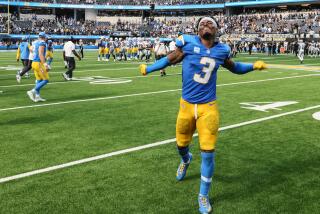Raider Reserve Williams Has More Than Football on Mind
- Share via
Jamie Williams’ name does not show up often in the Raiders’ offensive statistics.
After eight games, he is not listed under scoring because he has not scored a touchdown. He is not listed under receiving because he has not caught a pass. The only category the reserve tight end can be found under is kickoff returns. He has one, for no yardage.
So after catching 178 passes for nearly 2,000 yards in 12 seasons in the NFL, Williams finds himself as a seldom-used short-yardage run-blocking specialist in the twilight of his career.
Does this bother Williams?
“No, because I have so many other interests than football,” said Williams, who signed with the Raiders before the season as a free agent from the San Francisco 49ers. “Football now is a lot easier for me as a whole because there are so many other things I am interested in from an academic standpoint.”
One area Williams is greatly concerned about is how African American males are depicted by the media in society.
“I’ve realized that there are other things in life a lot more complicated than football,” he said. “I have a tougher time trying to figure out the cause and effect of the black male’s position in society. It’s of great concern for me to find out what can be done to turn the tide.”
Williams, who began his career with the St. Louis Cardinals in 1983 before playing with the Houston Oilers and the 49ers, has paid more than lip service to this issue.
In the spring of 1993, he produced a 30-minute film documentary, “The Black Quarterback and the Media,” as a master’s degree project for the School of Journalism and Mass Communications at San Jose State.
The documentary has received rave reviews for its in-depth look at issues seldom talked about in football. Williams interviewed current and former players, reporters and sociologists about the black quarterback’s role in the NFL.
“I was glad to see such pertinent information given through the media,” Raider quarterback Vince Evans said. “The black quarterback has not been given the same opportunity as white quarterbacks. It is a situation that has been hush-hush over the years.”
Williams not only traces the history of the black quarterback in the NFL from “Jefferson Street” Joe Jefferson to Warren Moon, but also deals with the portrayal of such quarterbacks in the media.
“When (a black) gets in that leadership role, whether as quarterback or coach, our society as a whole is not quite comfortable with that,” Gene Washington, a former college quarterback and NFL wide receiver, says in the film. “That’s the issue that really needs to be looked at. I think clearly that we’ve gotten to the point that we realize that black athletes and black coaches can do the job well. But, there are still some problems and why is that?”
Williams does not provide answers in his film, but he does ask many questions.
“I’m not out to say this group is racist or that group is racist, but I do feel that there are too many myths portrayed by the media,” said Williams, who graduated with a degree in broadcast journalism from Nebraska.
“For example, it’s crazy to say that a white player can be very heady and intelligent, but can’t be a great athlete. While it’s also as crazy to say that a black player can be a great athlete but not heady and intelligent at the same time.”
Williams followed closely the coverage of the sideline argument between Raider Coach Art Shell and quarterback Jeff Hostetler during the Miami game and the debate about whether Shell uttered a racist remark.
“From the perspective of someone on the team, it was a dead issue right after it happened,” Williams said. “Most guys who’ve ever played know that stuff like that happens and it is all part of the process. You play with people you don’t really like at times and you have disagreements, but you get over it and no one’s feelings are hurt.
“But because our society is race sensitive again, when that report (of Shell allegedly calling Hostetler “another white quarterback, just like Schroeder”) came out, it raised a few eyebrows. The thing is that (Shell) is and always will be a black man who is in a leadership position. Everything he does is under the microscope.
“It bothers me that he has had to go through this when both sides have denied the story, while other highly visible coaches like Mike Ditka, Buddy Ryan and Bobby Knight--who have constantly demoralized players--are treated differently. It seems like the media was just looking for something to attack.”
Williams, 34, took nearly a year to produce the documentary and hopes to make it into a two-hour film. He already has contacted ESPN and Fox television, and says they have expressed interest in making it into a larger project.
“In many ways, sports are a reflection of society,” Williams said. “Stereotypes will continue to be in the back of our minds until we are showed differently. The media has the opportunity and should have the obligation to break down and enlighten the public.”
More to Read
Go beyond the scoreboard
Get the latest on L.A.'s teams in the daily Sports Report newsletter.
You may occasionally receive promotional content from the Los Angeles Times.










